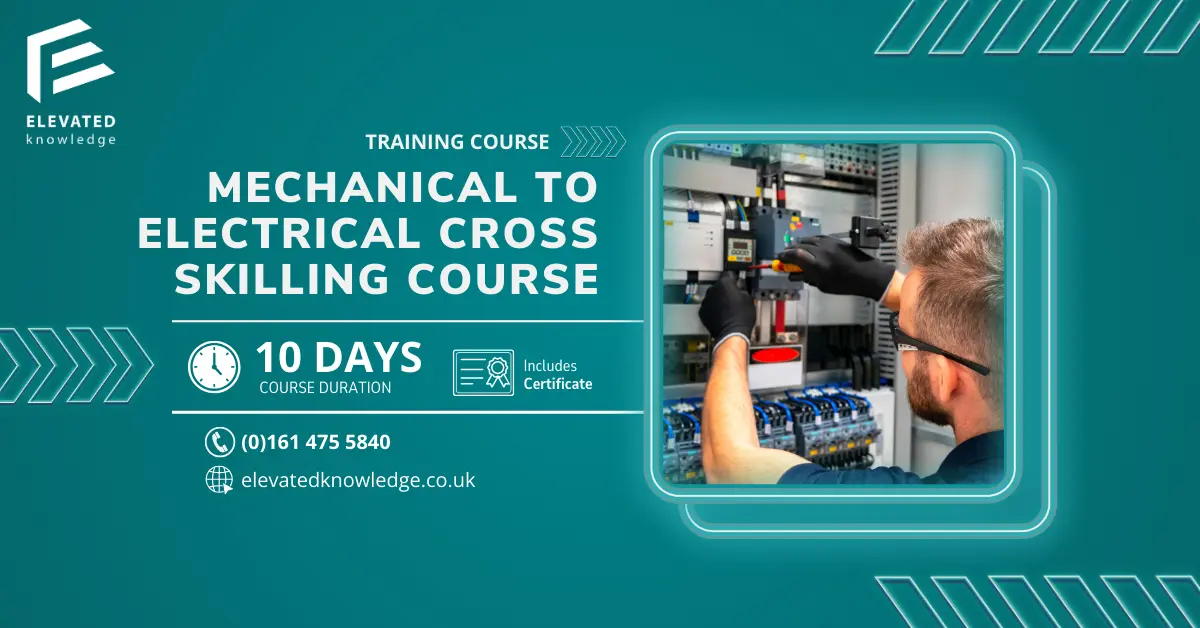Mechanical to Electrical Cross Skilling Course
Objective:To provide delegates with the necessary knowledge skills and safe working practices to enable them to confidently and safely undertake a wide range of electrical tasks in an industrial setting.
Course duration: 10 days
Course Price: £1,995 + VAT (per person)
Location: Stockport
Pre-course requirements:
Delegates should have a broad industrial background and a good working knowledge of a range of hand and power tools, along with an understanding of workplace health and safety.
DURATION
Registration Fee
PRICE
BOOK NOW
Places are limited on this course, book now to avoid disappointment
What You Get
Course Outline Electrical Safety
- Relevant aspects of the Electricity at Work Regulations 1989
- Methods of electrical isolation and safety checks done on electrical equipment before work is carried out
- Fundamental requirements of the Provision and Use of Work Equipment Regulations 1992
- Correct Termination Procedures
- Correct action in the event of accidental electric shock
- The difference between domestic and industrial standard
- Reason for earthing
- Double Insulation
- Reasons for balancing electrical systems
- Methods of Circuit Protection
Isolation Procedures
- Single phase
- Three phase
- Distribution Boards
- Verification of Safe Isolation
Electrical Drawings
- Explanation of schematic drawings
- Demonstration and practice in understanding circuit wiring diagrams
Test Equipment - Demonstration and practice in the use of the following:
- Insulation and Continuity Tester
- LED Type Voltage Tester
- Digital Multimeter
- Clamp on Ammeter
Fundamentals of Electricity
- Definition of standard units
- Ampere
- Watt
- Volt
- Ohm
- Concept of alternating current and how it is produced
- The difference between single and three phase supply
- Using Ohm’s Law in practical applications
- DC Supplies
- Fundamental differences between AC-DC
Single and Three Phase Electrical Motors and Control Circuits
- Types of motor and their applications
- Types of Starters (DOL + forward/reversing + Star/Delta)
- Isolation Procedures
- Continuity Checks
- Alter Direction of Rotation
- Connection and disconnection of single and three phase
- Checking and resetting overloads
- Wiring various control circuits
- IP Ratings
Inverters & Soft Starters
- Overview
- Applications
- Connection and Disconnection
- Basic Programming
Proximity Switches
- Type of proximity switches
- Optical
- Capacitive
- Inductive
Fault Diagnosis
- Principles of diagnosing electrical faults
- Logical fault analysis
- Replacement of Fuses
- Replacement of Indicator/warning lamps
- Rectification technique
Outcomes
Can you deliver this course on site?
Yes, we offer this course as classroom training as standard or for group booking at your locations please contact us directly.
What are pre-course requirements?
Who is this course for?
Overview
- Objective: To provide delegates with the necessary knowledge skills and safe working practices to enable them to confidently and safely undertake a wide range of electrical tasks in an industrial setting.
- Successful completion of the course will result in the issue of an Elevated Knowledge certificate of completion.
- Course can be delivered on site or at Elevated Knowledge designated premises in Stockport.
Mechanical to Electrical Cross Skilling Course

Get a Free Quote for Group Bookings
This course can also be delivered on company premises.
Please get in touch for further dates & information on this course or in-house quotation.

We Got You Covered
ALL COURSE NOTES/WORK FOLDER AND
REFERENCE MATERIAL ARE PROVIDED ON OUR PROGRAMMES*.
Please also be aware there will be home study, tests (both practical and theoretical) for all our programmes.
*Unless otherwise stated
Classroom Education
More Info
Experience excellence in education by choosing Elevated Knowledge as your preferred destination for apprenticeships and Commercial Technical Engineering Skills courses.
Our state-of-the-art centre boasts comfortable and fully equipped classrooms, providing an ideal environment for immersive learning. At Elevated Knowledge, we are committed to delivering top-notch education in electrical, mechanical, fabrication/welding and the lift engineering disciplines.
Our experienced instructors and hands-on approach ensure that you not only gain theoretical knowledge but also practical skills that are crucial in today's competitive job market. Elevate your career prospects by choosing Elevated Knowledge as your educational partner. Join us in our cutting-edge facility and embark on a journey of skill development and professional growth.
Online Education
If you would prefer to learn online, we cater for this too.
More Info
Embrace flexibility and convenience with Elevated Knowledge's online training option. We understand that life's demands can be dynamic, and we're here to accommodate your schedule. Our online courses offer the same high-quality content and expert instruction as our in-person classes.
Whether you're looking to enhance your skills in electrical, mechanical, fabrication, or welding, our virtual platform provides a seamless and learning experience. Enjoy the freedom to engage with course materials from the comfort of your own space while still benefiting from the expertise of our seasoned instructors.
Elevate your knowledge and expertise with our online training, designed to meet the demands of your busy life without compromising the quality of your education. Join Elevated Knowledge online and advance your career on your terms.
ON -SITE COURSES
More Info
Optimise your team's potential with Elevated Knowledge's customised group training options, bringing our expertise directly to your workplace. Choose from our diverse range of courses in electrical, mechanical, fabrication, and welding, and have them delivered right on your company's site using your own equipment.
This bespoke training approach ensures that your team not only gains theoretical knowledge but also hones practical skills directly relevant to your industry. Our experienced instructors will tailor the content to meet the specific needs of your business, fostering a more targeted and impactful learning experience.
Elevate your team's capabilities and efficiency by opting for on-site group training with Elevated Knowledge, where we bring the classroom to your workplace for a seamless and tailored educational journey.
